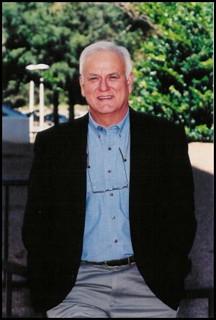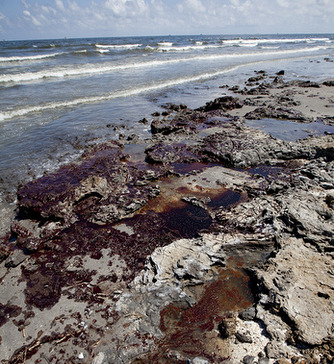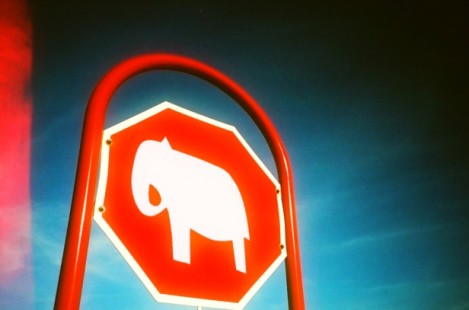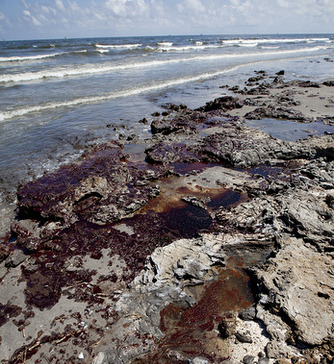 Dr. J. Steven Picou is Professor of Sociology at the University of South Alabama. He is currently working on human response to the BP oil spill.Photo courtesy of stevenpicou.com
Dr. J. Steven Picou is Professor of Sociology at the University of South Alabama. He is currently working on human response to the BP oil spill.Photo courtesy of stevenpicou.com
Steven Picou doesn’t have the happiest of jobs. He specializes in the human toll of disasters. As a sociology professor at the University of South Alabama in Mobile, he has studied the social fallout from Hurricane Katrina, the nation’s worst “natural” disaster, and from the Exxon Valdez oil spill in Alaska’s Prince William Sound which, until BP’s unstoppable leak, was America’s largest and most destructive “technological” disaster. Picou draws a sharp distinction between natural and technological events. The drawn out recovery period and the uncertainly that comes with it make technological disasters much more threatening to the health and welfare of the affected people and communities.
Not surprisingly, Picou has spent the last several weeks traveling throughout the Gulf — his home region — speaking to communities, agencies, and relief workers about what they can do to help themselves and their communities cope with the unfolding tragedy. I reached him by phone from the Gulf.
Q. You have documented the effects of the Exxon Valdez oil spill on the mental health of Alaskan communities for more than 20 years. What did you find?
A. We found impacts at three important levels, and all are interrelated:
There’s the community level. Technological disasters result in a principal responsible party, so there’s someone to blame. That leads to a lot of anger and a lot of uncertainty as to how the ecosystem will respond to the poison. This uncertainty tends to maintain itself over time.
After a natural disaster, people quit blaming God after a week or so and they pull together and pool resources and tend to form a therapeutic community. After a technological disaster, our research shows that a corrosive community ensues. There is social conflict. People tend to marginalize other groups, and people tend to self-isolate.
So the differences relate to whether or not a community can maintain its social capital, and by that I mean, trust in one another, in the local community institutions, maintain their social networks, both kinship and friendship, and have a sense of agency like they want to participate in the community and its activities.
At the second level, the family level, we saw increases in divorce, in domestic violence. With that, you have impacts on children and on the family stability, which is very important.
At the individual level, the mental health level, all of these cascade into one another. We documented severe depression, anxiety, long term anger, symptoms of Post-Traumatic Stress Disorder (PTSD), as well as feelings of helplessness. It’s not just a person suffering from depression and living in a typical normal American community. It’s a person suffering from depression because their quality of life in the community has changed, their family relations have changed, and they really see no end to the situation.
Q. Are you seeing parallels now in the Gulf?
A. Definitely. In terms of BP representatives and agency representatives meeting with angry citizens in high school gyms, and saying, ‘we will make you whole again; we will pay all legitimate claims.’ Well, that was exactly the script that Exxon used. The same words. So you see angry, frustrated people.
However, we had a suicide in Orange Beach, Alabama on the 65th day [after the leak]. It was four years before the first suicide occurred up in Prince William Sound. So we’re on a fast forward in terms of impact. I certainly was not expecting such extreme social pathology this soon.
We’ve also gotten word from the little community of Bayou La Batre that their police calls have doubled in the last month. That’s an indication that those problems with domestic violence and alcohol abuse are filtering down through these tiny communities.
Q. Can we expect more news like this?
A. It’s just the beginning of a marathon.
Q. You designed workshops for the Exxon Valdez communities. Is it too soon to start something similar in the Gulf?
A. We’re actually doing it. We’re doing peer listener training workshops where you teach people to be good listeners, and how to have effective communication. You teach people what not to say to someone in distress. Then you provide some training on the signs of mental health problems. Once you do that, you expand the network of people who can help. This is not a silver bullet. But it’s a very flexible program shown to be highly effective in Alaska from 1995-1997.
 Oil now covers much of the Gulf coastPhoto courtesy of Greenpeace via flickr
Oil now covers much of the Gulf coastPhoto courtesy of Greenpeace via flickr
Q. What helps communities recover from these disasters?
A. We try to change the role of people in the community from isolated victim to responsible participating helper. When you get people helping one another, that’s the first step.
Then you let people know you’re not the only community that has gone through this. Education is powerful. Research from numerous contaminated communities — Three Mile Island, Love Canal, Chernobyl, Bhopal — all show the drastic differences between technological and natural disasters.
And then you give them information on the symptoms of depression, PTSD, feelings of helplessness, and how to cope with uncertainties and also with anomalous loss. When you say, ‘I’ve lost my way of life,’ that’s not very tangible. You have to bring people together so they know that, yes, there is a consensus about what we have lost and how we need to restore it.
The programs have to be based on outreach and developing resources. We need to get resources not only to mental health centers, but to extension agents, and sea grant agents, people who have been out in these communities for 20 years. They’re trusted. They know people. They can start positive movement with legitimacy. To have someone come down from some major psychiatric center and tell people what to do is just not going to work.
Q. You’ve been making the distinction between technological and natural disasters. Can you expand on that a bit?
A. In natural disasters, you essentially have stages: warning, threat, impact, rescue, inventory, restoration, and recovery.
A technological disaster — a human-caused contamination of the ecosystem — is not a typical part of the geographical area you live in. I live in Orange Beach, Alabama. We have hurricanes. We know what to do, how to evacuate. We have places to go. Because they’re going to come every year.
An oil spill like this should have never happened. It was guaranteed to be virtually impossible, and then guaranteed that, if it did happen, we had the resources to clean it up in a timely fashion. Well, none of that was true.
So you have people who received a warning, they see the threat, they’re feeling the impact, and now they’re blaming. There’s no all clear [end] signal after a technological disaster. People become trapped in that cycle of warning, threat, impact, blame.
Q. How long does it take (if ever) for life to get back to “normal” for people who have experienced this kind of disaster?
A. We collected data in 2009 in Alaska and found what I would call a significant minority of people still distressed (35-40%). And those who have recovered, or had no problems with the oil spill or the litigation were people who didn’t live there at the time of the spill. Not everyone runs amok. Some people have good coping skills, some people have alternatives, some some make good decisions. Others are caught in this trap and can’t get out. People who were most stressed in [Alaska] 20 years after were the litigants. The litigation became a source of stress.
Q. Is there anything about the Gulf that gives you hope that these people might be able to bounce back faster?
A. We’re going to have to monitor it. I don’t think there’s anything unique about any community that faces massive contamination of the environment that gives you any sense of when it’s going to be over. Ecosystem impacts will be revealed over time and that will perpetuate worry, concern, and affect people’s livelihoods.



